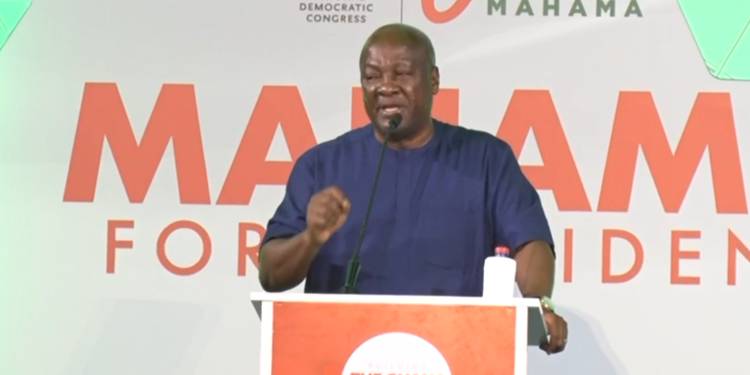President-elect John Dramani Mahama has declared his commitment to addressing Ghana’s economic challenges as his administration's top priority once he assumes office. In a recent meeting with the Algerian Ambassador to Ghana, Mourad Louhaidia, Mahama outlined his plans to stabilize the cedi, reduce inflation, and rejuvenate the country's economic growth.
Mahama expressed optimism about the future, emphasizing the importance of tackling the economic issues that have weighed heavily on Ghanaians in recent years. He stated that his government would implement measures to curb currency depreciation and inflation, which have had far-reaching impacts on households and businesses.
The president-elect's comments come amidst growing concerns over Ghana’s economic trajectory, with many citizens calling for decisive action to restore stability and improve living standards. Mahama acknowledged these concerns, asserting that stabilizing the cedi would be a cornerstone of his economic recovery agenda.
During the meeting with the Algerian ambassador, Mahama also highlighted the significance of fostering stronger relationships with Ghana’s international partners. He underscored the need for closer cooperation with nations like China to address the country's pressing economic challenges. “We are looking to focus and bring Ghana back up in terms of economic growth, in terms of stabilizing the currency, in terms of bringing down inflation. And this is the time Ghana needs to work even closer with its partners, including China,†he said.
Mahama revealed plans to engage with China and other key partners as soon as the transition process is complete. “Once we get the transition out of the way, it is our hope that we will be able to constitute a delegation to begin engaging with China on the issues of our technical cooperation,†he added.
China has been a critical partner in Ghana’s development efforts, particularly in infrastructure and trade. Strengthening ties with Beijing could provide much-needed support for Mahama’s economic agenda, especially in areas such as technical assistance and debt restructuring.
The meeting with Ambassador Louhaidia was also an opportunity to reaffirm Ghana's diplomatic relationships. The Algerian diplomat congratulated Mahama on his electoral victory and pledged his country’s continued support for Ghana’s development. Mahama expressed gratitude for Algeria’s solidarity and emphasized the importance of regional and international partnerships in achieving sustainable growth.
Economic stability has been a central theme of Mahama’s campaign, with the president-elect promising to reverse the challenges that have plagued Ghana’s economy under the outgoing administration. The depreciation of the cedi against major foreign currencies has been a particularly pressing issue, contributing to rising costs of goods and services and placing a burden on businesses and consumers.
Inflation has also surged in recent years, eroding the purchasing power of ordinary Ghanaians and deepening economic inequality. Mahama’s proposed measures aim to restore confidence in the economy, attract investment, and create jobs to alleviate the economic hardships faced by many citizens.
Observers have noted that Mahama’s focus on economic stabilization reflects the urgent need for structural reforms to address Ghana’s fiscal and monetary challenges. Analysts have urged the incoming administration to prioritize fiscal discipline, enhance revenue mobilization, and reduce public debt to create a stable economic environment.
In addition to his economic agenda, Mahama has pledged to promote transparency and accountability in governance. His administration plans to implement policies that ensure prudent management of public resources and equitable distribution of the benefits of economic growth.
Ghana’s private sector is also expected to play a key role in Mahama’s recovery plan. The president-elect has stressed the importance of creating an enabling environment for businesses to thrive, including addressing challenges such as high borrowing costs and inadequate infrastructure.
As Mahama prepares to take office, Ghanaians are hopeful that his administration will deliver on its promises and usher in a new era of economic stability and growth. The task ahead is undoubtedly daunting, but the president-elect’s emphasis on collaboration and pragmatic solutions offers a glimmer of hope for a brighter future.
The transition period provides an opportunity for Mahama to lay the groundwork for his ambitious agenda. With the support of his team, international partners, and the Ghanaian people, the incoming administration has the potential to turn the tide and restore confidence in the country’s economic prospects.
As the nation waits for the official handover of power, Mahama’s message is clear: stabilizing the economy and improving the lives of ordinary Ghanaians will remain at the heart of his presidency. His plans to address inflation, strengthen the cedi, and build international partnerships signal a focused and determined approach to tackling the challenges ahead.


